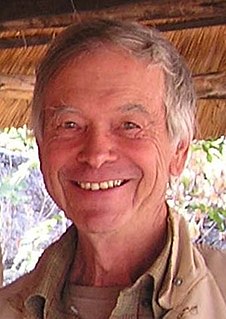Ein Zitat von Huston Smith
Als die wissenschaftliche Methode entstand, eröffnete sie uns ein neues Fenster zur Wahrheit; nämlich eine Methode, durch laborkontrollierte Experimente wahre Hypothesen von falschen zu trennen.
Verwandte Zitate
Es scheint mir, dass über wissenschaftliche Methoden viel Aufsehen erregt wird. Ich wage zu glauben, dass diejenigen, die am meisten darüber reden, auch die wenigsten tun. Wissenschaftliche Methode ist das, was arbeitende Wissenschaftler tun, und nicht das, was andere Leute oder sogar sie selbst darüber sagen. Kein arbeitender Wissenschaftler fragt sich, wenn er ein Laborexperiment plant, ob er wirklich wissenschaftlich handelt, und es interessiert ihn auch nicht, welche Methode er als Methode anwendet.
Ich denke, dass es für einen Ökonomen wichtiger ist, kluge und anspruchsvolle wissenschaftliche Methoden zu beherrschen, als für einen Physiker, denn wenn kontrollierte Laborexperimente möglich sind, können sie einen praktisch leiten; Du konntest nicht in die Irre gehen. In der Ökonomie hingegen kann man durch Dogmen und Missverständnisse sehr in die Irre gehen.
Wie in der Mathematik, so sollte auch in der Naturphilosophie die Untersuchung schwieriger Dinge mit der Methode der Analyse immer der Methode der Komposition vorausgehen. Diese Analyse besteht darin, Experimente und Beobachtungen durchzuführen und daraus durch Induktion allgemeine Schlussfolgerungen zu ziehen und keine Einwände gegen die Schlussfolgerungen zuzulassen, sondern nur solche, die aus Experimenten oder anderen bestimmten Wahrheiten entnommen werden. Denn Hypothesen dürfen in der experimentellen Philosophie nicht berücksichtigt werden.
Eine der größten Errungenschaften der westlichen Zivilisation ist die Entwicklung der wissenschaftlichen Methode und der wissenschaftlichen Disposition, die die Entwicklung falsifizierbarer Hypothesen über die Welt und den Unwillen mit sich bringt, unbestätigte und nicht theoretisierte Behauptungen über die Welt als Wahrheit zu betrachten, nur weil jemand das behauptet sie sind wahr.
Wissenschaft ist nichts anderes als eine Untersuchungsmethode. Die Methode besagt, dass eine Behauptung nur dann gültig ist und allgemein akzeptiert wird, wenn sie von anderen reproduziert und dadurch unabhängig überprüft werden kann. Die unpersönliche Strenge der Methode hat seit 400 Jahren zu enorm wirkungsvollen Ergebnissen geführt. Die wissenschaftliche Methode ist völlig unpolitisch. Eine wissenschaftliche Wahrheit ist nachweisbar, egal ob man schwarz oder weiß, männlich oder weiblich, alt oder jung ist. Es ist nachweisbar, ob Sie den Experimentator kennen oder nicht.
Wir simulierten das Raubtier mit Vieh und das mehrjährige Grasland kehrte zurück. Einfach das Ganze zurückstecken und da war es. Sie werden feststellen, dass die wissenschaftliche Methode niemals etwas entdeckt. Aufmerksame, kreative Menschen machen Entdeckungen. Aber die wissenschaftliche Methode schützt uns vor Spinnern wie mir.
Wer experimentiert, muss sich dabei aller Vorurteile entledigen. Es ist also klar, dass, wenn wir eine Methode der experimentellen Psychologie nutzen wollen, das erste, was notwendig ist, darin besteht, alle früheren Glaubensbekenntnisse aufzugeben und mit Hilfe der Methode auf der Suche nach der Wahrheit voranzuschreiten.
Wissenschaft ist im Kern einfach eine Methode praktischer Logik, die Hypothesen anhand von Erfahrungen prüft. Im Gegensatz dazu ist der Szientismus das Weltanschauungs- und Wertesystem, das darauf besteht, dass die Fragen, die die wissenschaftliche Methode beantworten kann, die wichtigsten Fragen sind, die Menschen stellen können, und dass das von der Wissenschaft gewonnene Weltbild der Realität besser entspricht als jedes andere .
Die wissenschaftliche Methode ist die ultimative elegante Erklärung. Es ist die ultimative Grundlage für alles, was den Namen „Erklärung“ verdient. Es macht keinen Sinn, über Erklärungen zu sprechen, ohne einen Prozess zur Entscheidung darüber zu haben, was richtig und was falsch ist, und genau darum geht es bei der wissenschaftlichen Methode im weitesten Sinne. Alle anderen wunderbaren Erklärungen, die hier gefeiert werden, verdanken ihren Ursprung und ihre Glaubwürdigkeit dem Prozess, durch den sie überprüft werden – der wissenschaftlichen Methode.
Aufgrund meiner Ausbildung betrachte ich mich definitiv als Method-Schauspieler. Ich könnte bestreiten, was die Leute unter einem Method-Schauspieler verstehen. Für mich ist ein Methodenschauspieler ein Schauspieler, der über eine Technik verfügt. Das hat Methode. Und nicht eine Methode, sondern was auch immer erforderlich sein könnte. Ein Methodenschauspieler lernt also immer.
Der Physiker verfügt bei seinem Studium natürlicher Phänomene über zwei Methoden, um Fortschritte zu erzielen: (1) die Methode des Experiments und der Beobachtung und (2) die Methode des mathematischen Denkens. Ersteres ist nur die Sammlung ausgewählter Daten; Letzteres ermöglicht es, auf Ergebnisse über nicht durchgeführte Experimente zu schließen. Es gibt keinen logischen Grund, warum die zweite Methode überhaupt möglich sein sollte, aber man hat in der Praxis festgestellt, dass sie funktioniert und einen angemessenen Erfolg hat.
Unter Methode versteht man in erster Linie einen Weg oder Weg des Transits. Daraus sollen wir verstehen, dass die erste Idee der Methode ein schrittweiser Übergang von einer Stufe zur nächsten in jedem Kurs ist. Wenn man den richtigen Weg einschlägt, wird es die wahre Methode sein; Wenn wir Unrecht haben, können wir nicht auf Fortschritt hoffen.






































